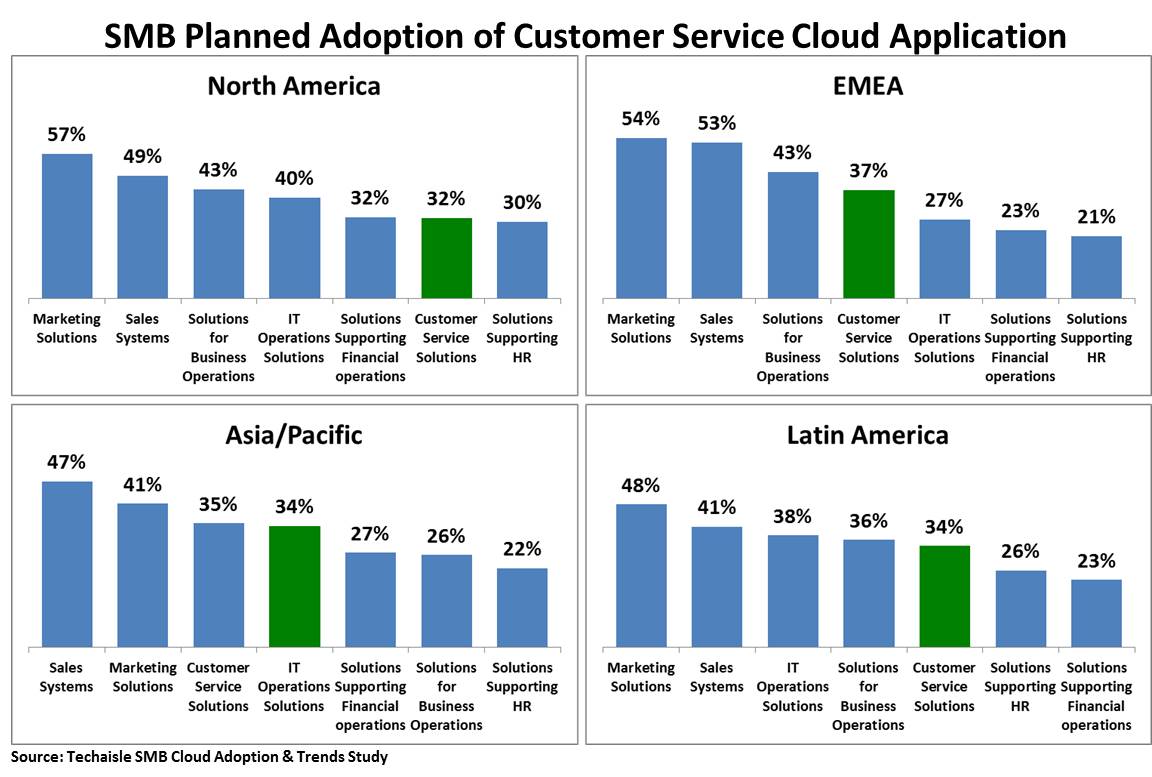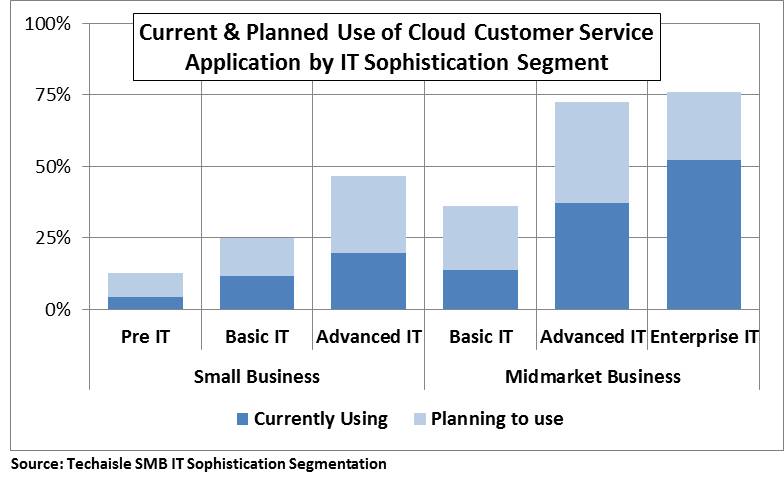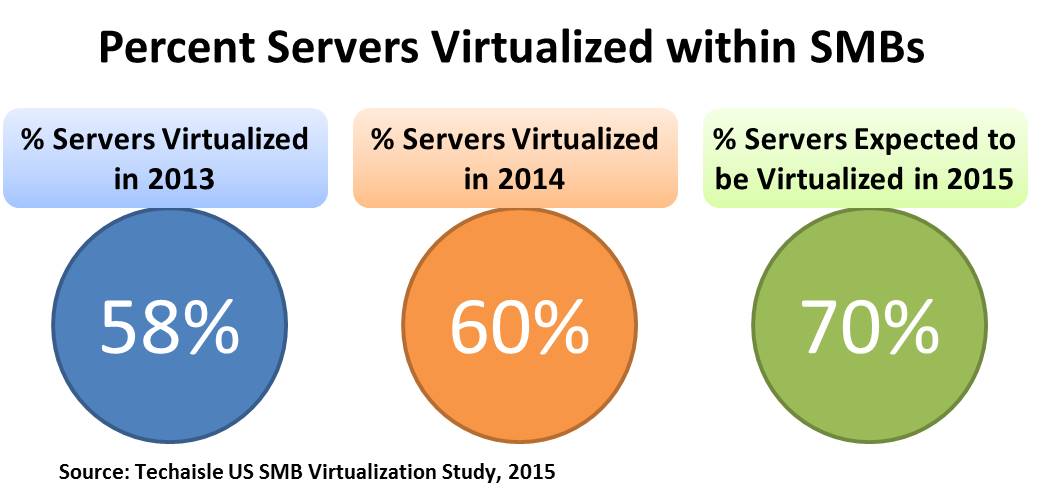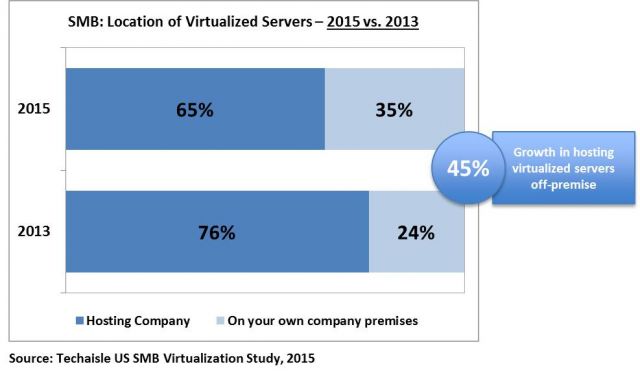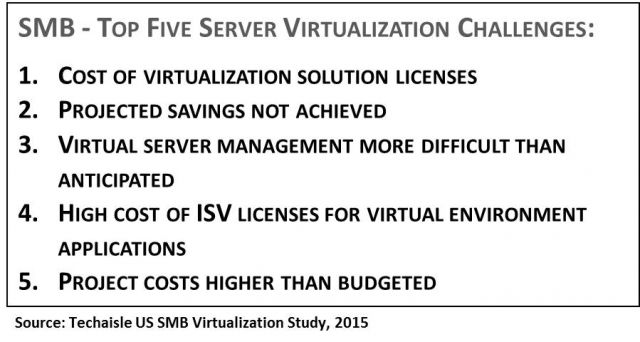SMB Current and Planned adoption
Techaisle’s SMB Managed Services adoption study (US, UK, Germany, Brazil, Mexico, Australia, China) shows that a substantial and rapidly-growing segment of SMBs across different geographies are using some combination of managed services to support IT and business requirements. Drilling into the US data, 40% of SMBs are currently using one or more types of managed services, increase of 21% from a year ago. Take-up of managed services within micro businesses is relatively low but doubles within the 10-19 employee size businesses. Techaisle survey data also shows that confusion around what managed services is and how they work has a negative impact on take-up in this segment, reinforcing the importance of education to building acceptance within this market.
Managed services usage rates are far higher within larger SMBs. Firms with 20-499 employees, who are trying to scale IT faster than can be achieved through in-house staff, are very avid users of managed services. Larger midmarket firms, where managed services is often a means of augmenting current staff (to deliver on niche specialities and/or to cover standard tasks so that in-house resources can move on to new initiatives), are also heavy users of managed services.
As impressive as these figures are, the ranks of managed services SMB users are poised to swell further within the next 12-24 months. Survey responses from companies with 1-9 employees indicate that the proportion of very small businesses using one or more managed services will double during this period. Growth within other SMB e-size segments will be less dramatic, but aggressive nonetheless.
The combination of increased reliance on technology as a key element of business success (as shown in the study), burgeoning complexity and cost constraint has created a “perfect storm” for use of managed services. SMBs are not just dealing with more technology, but with more complex technology.
SMB Managed Services acquisition challenges
A question exploring the issue of “what are the toughest challenges faced by SMBs when purchasing managed services” in the Techaisle SMB Managed Services Adoption Trends survey found four broad challenges: 1/ identifying solutions that address operational support requirements, 2/ selection of qualified providers, 3/ presenting a valid business case to senior management, and 4/ available funding.
The primacy of these issues changes with employee size:
- Microbusinesses (1-19 employees) struggle most with finding appropriate suppliers – MSPs who understand and can work with companies that lack internal IT resources.
- Small businesses (20-99 employees) struggle most with providing a valid business case to management. These firms are on the line separating the “managed services as a replacement for in-house staff” approach of microbusinesses and the “managed services as a means of augmenting IT management” approach of larger SMBs. At least in some cases, management considers outsourced services to be an either/or proposition rather than an “and” and needs help in understanding why a mixed approach to IT service delivery makes both technical and economic sense.
- Available funding is the key issue for smaller midmarket (100-499 employees) businesses. These firms are pulled between the need to keep pace with IT opportunities and requirements (as defined by larger competitors) and the need to watch cash flow very carefully (as is the case with small businesses).
- Larger midmarket firms (500-999 employees) are challenged primarily by identifying solutions addressing operational support requirements. These companies have specific needs and require complex solutions. It’s telling that it is also a challenge for these firms to find qualified suppliers and to develop a business case that can be absorbed by senior management.
SMB's use careful evaluation of supplier and platform
Techaisle’s corresponding SMB Channel Partners trend study (survey across several countries) and The State of US SMB Managed Services Channel study shows that the percent of US SMB channel partners offering managed services has increased to 71% from just below 70% in 2013.
There is a tight connection between managed services supply and demand. The interaction between SMB buyers and the firms that supply managed services is important to the vibrancy of the managed services market. The SMB Managed Services Adoption Trends explored some of the key issues in supplier evaluation and managed services sourcing. Once a relationship has been struck, SMBs and managed service providers need to connect effectively through the managed service delivery platform. Survey results indicate that there are five key elements that are integral to a compelling platform and SMBs use an average of 3.2 factors for MSP evaluation criteria.
SMB MSP fragmentation and coming channel transformation
Techaisle believes that the channel is at the beginning of a migration from generalist to specialist firms that will play out over the next few years. The variety and depth of managed services will make it difficult for non-specialists to keep pace with MSP specialists. Techaisle survey trend data clearly reveals that SMB channel partners have hit a point of fragmentation: they can be all things to all people today, but not in 2018. On this topic and more in Techaisle’s channel subscription services consisting of:
Related research areas
- SMB Channel Trends
- The State of SMB Cloud Channel
- The State of SMB Managed Services Channel
- The State of SMB Virtualization Channel
- The State of SMB Mobility Channel
and corresponding SMB coverage:
- SMB Cloud Adoption Trends
- SMB Mobility Adoption Trends
- SMB Managed Services Adoption Trends
- SMB Virtualization and Converged Infrastructure Adoption Trends
- SMB Collaboration Adoption Trends
- SMB IT Decision Makers: TDM vs. LoB
- SMB Big Data Adoption Trends
- SMB Security Adoption Trends
















